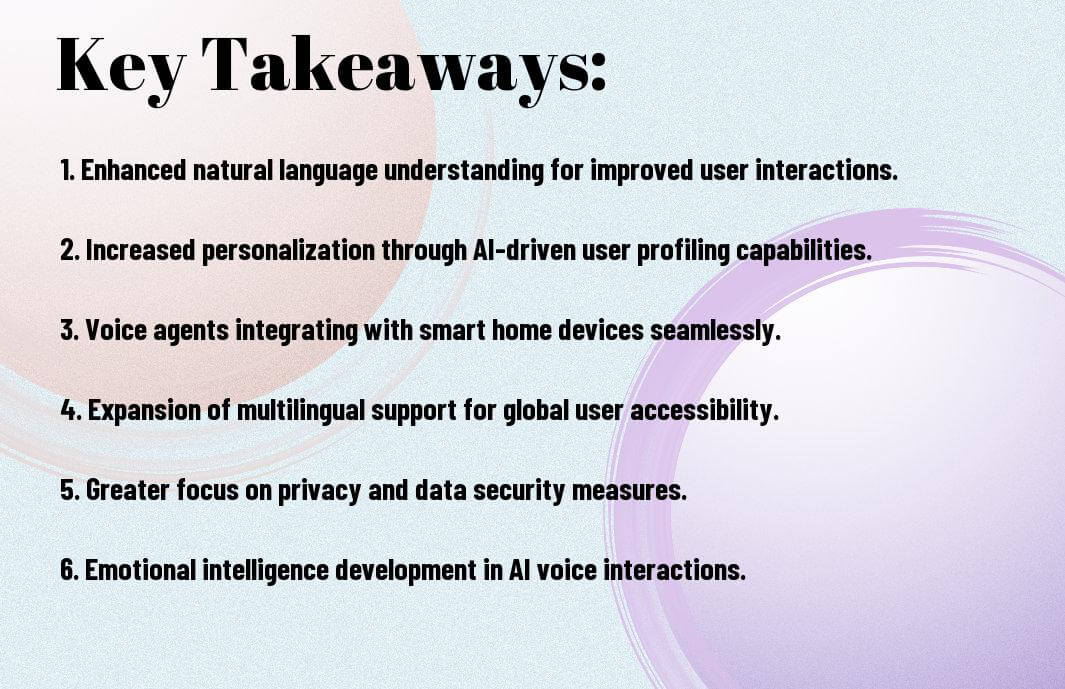Voice technology is evolving rapidly, and if you’re keen on navigating the landscape of AI voice agents, understanding the trends shaping their future is crucial. As you look ahead to 2025, innovations in personalization, natural language processing, and multi-modal interactions are set to revolutionize your experience with these digital assistants. To dive deeper into the exciting developments in AI, consider checking out this article on What are the Hottest Generative AI Trends Leading into 2025?.

Current Landscape of AI Voice Agents
For anyone interested in the technological advancements reshaping communication, the landscape of AI voice agents today is both intriguing and rapidly evolving. With applications ranging from customer support to personal assistance, these agents are transforming how you interact with your devices. If you’re keen to explore this further, check out Top AI Statistics and Trends 2025 – Teneo.ai for insightful data and projections.
Market Growth and Adoption Rates
With businesses increasingly recognizing the value of AI voice agents, market growth and adoption rates are surging. Reports indicate a considerable rise in consumer engagement and investment, paving the way for widespread use in various industries by 2025.
Key Players in the Industry
Between established tech giants and innovative startups, the AI voice agent industry boasts a diverse array of key players. Companies like Amazon, Google, and Apple are continuously enhancing their offerings, driving competition and innovation.
To stay competitive, these key players invest heavily in research and development to optimize voice recognition, natural language processing, and user experience. As you explore your options, understanding how these industry leaders are shaping AI voice technology can provide you insight into the future capabilities and services that will soon be available to you.
Advancements in Natural Language Processing
Assuming you’re following the trajectory of AI, you’ll notice that advancements in natural language processing (NLP) are reshaping voice agents in remarkable ways. By 2025, NLP will enable these agents to not only interpret your queries but also understand nuance, tone, and intent, leading to more personalized interactions. This transformation will empower you to engage with technology in a more intuitive manner, making voice agents an integral part of everyday life.
Improvements in Understanding Context
Advancements in context understanding will allow voice agents to recognize subtleties and situational cues in conversations. You’ll benefit from more relevant responses, as these agents will no longer rely solely on keywords. Instead, they will grasp the broader context of your interactions—what you said, the time of day, and even your past preferences—resulting in enhanced fluidity and understanding in your conversations.
Emotion Recognition Capabilities
Any progress in emotion recognition technologies means that voice agents could interpret your emotional state through voice tone, speech patterns, and even pauses. This capability will enhance interactions, making them feel more human-like, as these agents can respond empathetically to your mood and needs.
Due to significant advancements in machine learning and acoustic analysis, emotion recognition can accurately detect subtle emotional cues in your voice. By 2025, you may find that your interactions with voice agents feel more organic and compassionate. Whether you’re frustrated, happy, or need encouragement, these agents will tailor their responses to your emotional state, fostering a richer and more engaging user experience. This emotional adaptability can transform how you engage with technology, making it feel more supportive and personalized than ever before.
Integration with Smart Devices
Once again, voice agents are set to evolve as they become more seamlessly integrated with smart devices in your home and daily life. By 2025, you can expect these AI assistants to function as central hubs, controlling everything from your thermostat to your lighting and security systems. This advancement will not only enhance convenience but also offer personalized experiences based on your preferences and routines.
Home Automation Trends
Trends in home automation are making your living spaces more intelligent and responsive. You will find yourself easily managing household tasks through voice commands, facilitating energy-efficient practices while ensuring your home is always secure and comfortable. As these systems become more intuitive, monitoring and adjusting your environment will be simpler.
Wearable Technology Enhancements
Enhancements in wearable technology are unlocking new capabilities for AI voice agents, making them even more useful in your daily interactions. Your smart wearables will not only track your activities but also anticipate your needs, allowing for a more holistic approach to personal well-being.
This integration will empower you to receive health insights, reminders, and notifications directly through your wearable devices. As voice agents become more embedded in wearables, you can expect greater accessibility to your personal data, enabling you to make informed decisions about your health and lifestyle. Whether you’re jogging, working, or relaxing at home, real-time voice assistance will be at your fingertips, enhancing your daily experiences.

Personalization and User Experience
Many advancements in AI voice agents are shifting towards more personalized and intuitive user experiences. As you engage with these technologies, expect them to learn your preferences and habits, tailoring interactions that feel more natural and efficient. In 2025, voice agents will be better equipped to adapt to your unique communication style, creating a dialogue that feels less robotic and more like a conversation with a trusted companion.
Tailored Interactions
Any interaction you have with an AI voice agent will likely become increasingly tailored to meet your personal preferences. By analyzing your past behaviors and choices, these agents will provide recommendations and responses that align more closely with your desires, enhancing the overall experience. You will find that your voice agent evolves to understand your specific needs, making every conversation more relevant and enjoyable.
User Privacy Considerations
Behind this wave of personalization lies an increasing concern for user privacy. As voice agents collect and process more of your personal information, ensuring that your data is protected will be paramount. You will need to think about how much information you share and what security measures are in place to safeguard your privacy.
To enhance user privacy, AI voice agents in 2025 will likely adopt more robust data protection measures and transparent practices. You may have greater control over your data, able to manage what is stored and how it is used. The focus on privacy will come from both technological advancements and regulatory pressures, aiming to build your trust in these systems. As personalization improves, it is crucial that your private information remains secure, allowing you to enjoy a customized experience without compromising your privacy.
Ethical Considerations and Regulations
Not only is the advancement of AI voice agents driving innovation, but it also raises significant ethical concerns. You need to be aware of how users’ data is handled, the transparency of AI decision-making processes, and the broader societal impacts of these technologies. As you explore the future, consider how regulations will evolve to ensure responsible development and deployment of AI, aiming to protect users and foster trust in these systems.
Addressing Bias in AI
At the heart of ethical AI development is the imperative to address bias. You should understand that data used to train AI voice agents may reflect societal prejudices, leading to discriminatory outcomes. As AI evolves, ensuring diversity in training data and implementing mechanisms for accountability will be necessary in creating fair and reliable technologies.
Future Legislation Impact
Below the surface of AI developments, legislative frameworks are adapting to govern the use of AI voice agents. You will likely see increased regulatory scrutiny aimed at protecting user rights and promoting ethical practices. This along with compliance requirements may reshape how companies design, implement, and monitor their AI solutions.
Also, as you navigate the landscape of AI voice agents, expect future legislation to impose standards that prioritize user safety and data protection. This could involve stricter guidelines on consent, transparency, and accountability in AI algorithms. Understanding these potential regulations will be necessary for anyone involved in AI development, ensuring you not only meet legal standards but also build trust with your users.
Predictions for AI Voice Agent Capabilities in 2025
All indications suggest that by 2025, AI voice agents will transform dramatically, becoming more intuitive and capable than ever before. With advancements in natural language processing and machine learning, you can expect these agents to handle complex tasks, making them indispensable in both personal and professional settings. For a deeper understanding, check out The 10 Biggest AI Trends Of 2025 Everyone Must Be ….
Enhanced Conversational Skills
Among the standout features you can expect in AI voice agents by 2025 are significantly enhanced conversational skills, enabling a more natural and engaging interaction. This will allow your voice assistant to not only respond accurately but also to comprehend nuances, emotions, and context, making dialogues smoother and highly personalized.
Potential for Increased Autonomy
Above all, the potential for increased autonomy in AI voice agents will revolutionize how you interact with technology. These agents will be able to make decisions and complete tasks with minimal human intervention, allowing you to delegate routine activities efficiently and focus more on strategic thinking.
At the heart of this increased autonomy is the capability of AI voice agents to learn from your preferences and behaviors over time. You will find that your voice assistant can predict your needs and suggest solutions proactively, whether it’s managing your calendar, navigating smart home devices, or assisting with research. This predictive capability will make your interactions more seamless, saving you both time and effort in daily tasks.
Summing up
The future of AI voice agents by 2025 promises exciting advancements that will enhance your interactions with technology. As personalization, multi-modal capabilities, and improved natural language processing emerge, you can expect these agents to become more intuitive and responsive to your needs. Embracing these trends will not only enrich your everyday experiences but also transform how you engage with devices and services in both personal and professional contexts.




